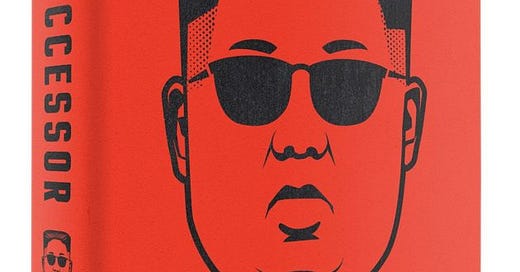The Great Successor: Inside North Korea

I highly recommend Anna Fifield’s The Great Successor. It’s full of information about not only the life of Kim Jong Un, but what’s happened inside North Korea since his ascent to the Red Throne. Most readers will be shocked by her description of the North Korean hell-state, but that’s all old hat to me. Here’s what surprised me in Fifield’s book:
1. Kim Jong Un didn’t just attend a fancy English-language school in Switzerland. After his expat guardians – his maternal aunt and her husband – defected, Kim was actually switched over to a German-language Swiss public school. Weird.
2. Kim’s top interest as a boy was basketball. His eagerness to befriend American basketball stars really is the fulfillment of a childish dream.
3. “Kim Jong Il spoke in public only once, and then only a single phrase, during his entire seventeen years in power. ‘Glory to the heroic soldiers of the Korean People’s Army!’ he said during a military parade in 1992.” Kim Jong Un started giving lengthy public speeches almost immediately.
4. Kim Jong Un has deliberately fostered a revolution of rising expectations:
North Koreans “will never have to tighten their belts again,” the Great Successor declared when he delivered his first public speech, marking the occasion of his grandfather’s one hundredth birthday. Kim Jong Un told the bedraggled populace that they would be able to “enjoy the wealth and prosperity of socialism as much as they like.”
5. Kim’s execution of his uncle Jang Song Thaek was part of a much larger purge. “Dozens, perhaps even hundreds, of Jang’s associates disappeared around the same time. Some of them were not just purged from the system but more likely executed. Those outside North Korea at the time fled.” Note: This probably means that the runners’ families were sent to slave labor camps or executed.
6. Just as Stalin stole Trotsky’s economic plan after purging him, Kim went on to implement Jang’s vision of watered-down Deng-style economic reforms. The Communist elite now openly enjoys a much higher standard of living. Some of this gain is trickling down to the commoners.
7. Kim Jong Un is eager to win over the millennial elite with capitalist luxuries and entertainment. “It was fun to be a rich kid in Kim Jong Un’s North Korea. The richest kid of all was making sure of it.”
8. Kim rushed to get a credible nuclear deterrent, then declared himself satisfied. And his behavior seems consistent with his intentions.
Just a week before his summit meeting with South Korea’s President Moon, Kim Jong Un delivered a speech to a Workers’ Party meeting in Pyongyang in which he declared the “byungjin” or “simultaneous advance” policy to be over. He no longer needed to pursue nuclear weapons – he had achieved them. He declared an immediate end to nuclear tests and intercontinental ballistic missiles launches…
From now on, Kim Jong Un said, he would be focusing on a “new strategic line.” He would be concentrating on the economy. And for that, he would need an “international environment favorable for the socialist economic construction…
In 2013, he had boldly elevated the economy to level pegging with the nuclear program after decades of “military first” policy. Five years later, almost to the day, he was unequivocally making economic development his top priority.
Before reading this book, I was already 85% confident that Kim Jong Un would rule North Korea for life. Now I’d go up to 90%. Despite his youth, he’s a skilled tyrant. However, I’m not quite as pessimistic about the fate of the North Korean people. Kim has dramatically relaxed the regime’s war on consumerism, and it is very hard to confine this rising abundance to the inner circle. People who think Kim will give up his nuclear arsenal are dreaming (or lying); while he lives, the best nuclear outcome we can hope for is “Don’t ask, don’t tell.” Kim may die young due to poor health; he might even be assassinated, though I doubt it. When he dies, North Korea – and the world – will get to throw the dice one more time. Until his death, however, Kim will stay the course.
The post appeared first on Econlib.



